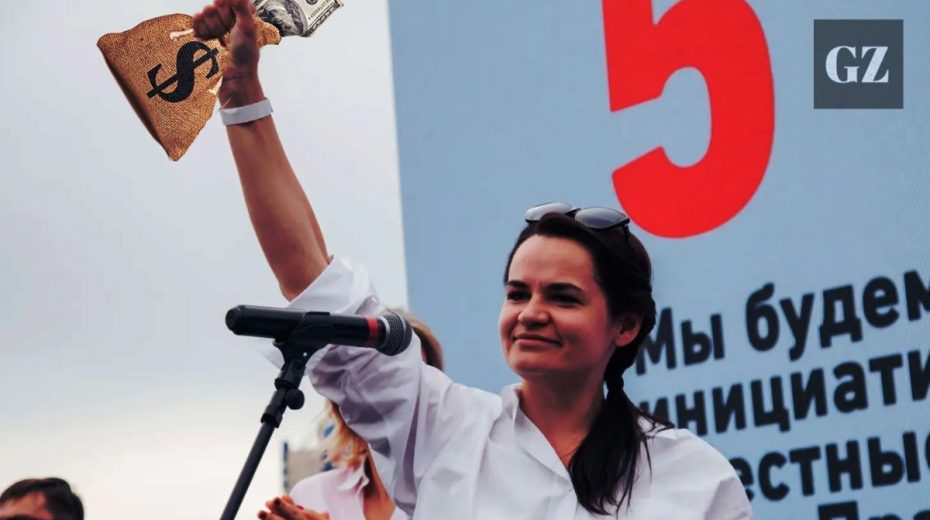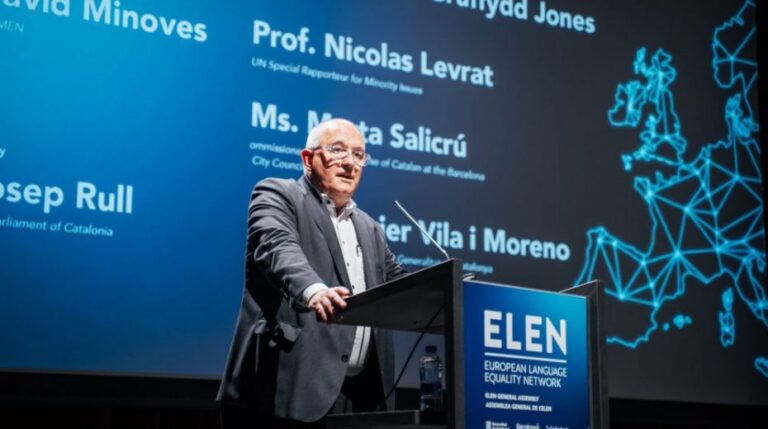
Sviatlana Tsikhanouskaya was hailed by Western governments and media as the savior and rightful leader of Belarus. But leaked emails reveal her increasingly unpopular campaign for power in Minsk nearly collapsed under the weight of corruption scandals and infighting.
When Sviatlana Tsikhanouskaya declared herself the “President” of an alternative Belarusian government in 2020, Western nations eager to oust Alexander Lukashenko—the country’s long-standing leader—and diminish Russia’s regional influence, embraced her and provided substantial financial support. The New York Times famously portrayed Tsikhanouskaya as a contemporary Joan of Arc.
Yet a series of public controversies gradually caused her Western backers to withdraw support from her unraveling efforts to unseat Lukashenko. In August, it emerged that she secretly accepted thousands of euros from Minsk’s KGB in August 2020, essentially cash in exchange for urging protesters to halt street demonstrations before fleeing the country. Tsikhanouskaya kept this covert arrangement hidden until exposure and has since sought to deny it.
Documents and emails leaked to The Grayzone expose how Tsikhanouskaya’s once-celebrated Belarusian “government in exile” came close to disintegration due to corruption, extravagant ambitions, incompetence, and internal disputes.
After asserting victory in Belarus’s August 2020 presidential election, Tsikhanouskaya quickly gained Western favor. Having fled to Lithuania and claiming legitimate leadership, her movement’s momentum declined. The onset of the Russian invasion of Ukraine in early 2022 shifted Western attention towards bolstering Kiev.
Seeking renewed international backing, Tsikhanouskaya established the United Transitional Cabinet (UTC) in August 2022. This government-in-waiting aimed to assume control should Lukashenko fall, relying on stringent Western sanctions against Minsk’s military aid to Russia to tip the balance.

Meanwhile, Tsikhanouskaya and her disparate team continued to collect hundreds of millions in Western funding. Despite their vast resources, they failed to make meaningful inroads toward gaining power or influencing events on Belarusian soil, essentially promoting Tsikhanouskaya’s image to Western audiences.
Although Tsikhanouskaya’s chances diminished domestically, leaked data obtained by The Grayzone shows Brussels and Washington believed she might still seize power, funneling considerable support into several initiatives endorsing the UTC.
For instance, the European Endowment for Democracy secretly awarded a year-long grant to elevate the UTC’s “recognition and legitimacy” as an “Alternative Government” by 2024 among both Belarusians and the international community. The EED was officially linked to the US government’s National Endowment for Democracy, which honored Tsikhanouskaya with its Democracy Service Medal in 2024.
The EED grant documents reveal a covert plan to bolster Tsikhanouskaya’s rise by creating a parallel government structure in exile. This included issuing a “new national passport… with international recognition” managed by the UTC and severing Minsk’s support for Russia’s campaign in Ukraine. These steps were envisioned as groundwork for a “future democratic Belarus” under the UTC’s control.

Additionally, Tsikhanouskaya’s cabinet aimed to devise a “comprehensive strategy for democratic transition” to map out the transfer of authority from Lukashenko’s regime to a democratic government, including detailed protocols for each phase of the shift.
The exiled leadership also sought to cement their influence by establishing a “permanent presence” in Kiev, showcasing their support for Ukraine against Russian aggression and embedding themselves within the Western anti-Moscow coalition.
The leaks detail how the UTC unraveled trying—and failing—to meet these ambitions. Despite Tsikhanouskaya’s efforts to please her Western backers with a strongly pro-European Union stance and confrontational rhetoric toward Russia, this pivot contributed to her public decline.
UTC’s political downfall follows anti-Russia, pro-EU campaign
In early August 2023, the UTC convened a summit in Warsaw themed “New Belarus.” This event was a valuable chance for Tsikhanouskaya and her supporters to regain Western attention and sympathy.
Leaked conference documents show the UTC seized this platform to propose ambitious plans.
Tsikhanouskaya’s shadow government declared a commitment to a “European perspective for Belarus,” aspiring to EU membership and introducing a “national passport of New Belarus” granting dissidents visa-free travel within the bloc. The UTC’s declaration carried a starkly anti-Russian message, demanding Belarus’s “withdrawal” from all Moscow-affiliated alliances and the removal of Russian military assets and forces from the country.


Following Lukashenko’s removal, the UTC pledged support for “Belarusian volunteers in Ukraine” battling Russian forces, endorsement of “pro-Ukrainian initiatives and campaigns,” and an end to Minsk’s alleged “complicity in Russia’s war.” Though these stances resonated politically with Western audiences, they further alienated Tsikhanouskaya’s already limited domestic support. Polls conducted by Western agencies consistently reveal that most Belarusians prefer closer ties with Russia over Brussels.
These deep-rooted pro-Russian sentiments help clarify why Tsikhanouskaya refrained from aggressive anti-Russia policies during her 2020 presidential bid. That year, her opposition’s ‘Coordination Council’ resolved that Belarus’s constitutional order and foreign policy would remain aligned with Russia if they came to power.
Like many European liberals, Tsikhanouskaya’s foreign policy dramatically shifted after the outbreak of the Ukraine conflict. Although the August 2023 conference generated some positive press, openDemocracy sharply criticized the UTC’s sudden Westward turn.
The outlet contended Tsikhanouskaya’s forceful EU membership pursuit and new confrontational approach to Russia revealed a disconnect from Belarusian opposition factions and public sentiment, with opponents feeling the UTC was “increasingly detached from their concerns.” openDemocracy also observed the exiled leaders wielded “little influence” inside Belarus and noted growing disenchantment among supporters regarding the UTC’s viability. By siding with the West, Tsikhanouskaya risked becoming “an irrelevance.”
Despite mounting isolation, Tsikhanouskaya and the UTC intensified their efforts. Their “New Belarus” passport became a focal point, initially attracting considerable media coverage and calls from European parliamentarians urging EU states to recognize the document officially.
However, the passport initiative soon generated internal disputes over financing and management, culminating in the resignation of a founding UTC member.
‘New Belarus’ parallel passport – failure or fraud?
In early June 2024, Valery Kavaleuski, a veteran Belarusian opposition activist and UTC Deputy Head responsible for Foreign Affairs, initiated a tense email dialogue with Tsikhanouskaya regarding the slow progress of the “New Belarus” passport. Weeks before, the Western-funded Belarusian Investigative Center exposed links between a Lithuanian printer assigned to produce the passports and Viktor Shevtsov, a Belarusian businessman dubbed “Lukashenko’s wallet” due to his close ties with the President.
Within the leaked emails, Kavaleuski expressed relief that this issue surfaced before signing a contract: “We were truly lucky… we would have been torn to shreds.” He also criticized the draft documents for errors, including the use of “Republic of Belarus” instead of “Belarus” and an inaccurately drawn border map showing territory transferred to Minsk. Kavaleuski remarked, “good that printing had not started yet.”
Beyond that, the passport project stumbled over the previous ten months. Several countries, such as Iceland and Lithuania, initially offered to issue the passports but later withdrew. Kavaleuski appeared unclear about many aspects of the project despite his nominal leadership position.
Tsikhanouskaya told him “there are no dedicated funds for the passport project,” and that all expenditures required UTC donor approval. Kavaleuski expressed confusion, noting this conflicted with earlier information about a Soros grant, which he helped arrange, that supposedly covered passport production materials.
Kavaleuski reminded Tsikhanouskaya that he had understood the passport would be “funded from Belarusian sources to preserve the grant for other uses,” a strategy he called “so ridiculous” and “not a state approach at all.” He further contested that money should not “disappear into ‘coordination’ beyond my knowledge and control.” The leaked EED grant specified the passport as one of several deliverables, implying additional funds might have been diverted by Tsikhanouskaya.
Tsikhanouskaya blamed Kavaleuski for the debacle, criticizing his failure to launch crowdfunding efforts and establish necessary infrastructure, including an “issuing office,” before hiring experts to produce and authenticate the passport. Kavaleuski responded sarcastically, “thank you for the sarcasm — I was running low on toxins in my system.”
See a translation of the full email exchange between Tsikhanouskaya (highlighted in yellow) and Kavaleuski (highlighted in gray) here.
‘Tired’ of ‘ultimatums’, Tsikhanouskaya loses deputy
Kavaleuski made a final effort to revive the passport project by proposing to hire a “Swiss expert” with not only experience but also a reputation and contacts who could expedite tasks typically requiring a month into mere hours or days. Despite multiple previous attempts to recruit passport specialists, all ended unsuccessfully.
He further requested reinstatement of his full leadership over the passport initiative, including authority to hire managers, make financial decisions during the formation of an issuing authority, recruit legal counsel, manage communications, and control a dedicated budget. He warned that refusal of any of these demands would prompt his resignation from the project.
Kavaleuski’s stance appeared justified. The day before, Tsikhanouskaya instructed him to “cease any public statements” about the passport and leave control solely to her, accusing him that “people are already laughing to your face [sic].” She refused to identify these critics and consistently evaded his inquiries regarding passport progress, investigations, and crisis management. In later messages, Tsikhanouskaya’s tone toward him was dismissive and passive-aggressive.
She claimed Kavaleuski already had “all necessary authority” and was “responsible and in charge” but had instead “provoked conflicts with anyone trying to help.” She showed no concern when Kavaleuski threatened to quit, stating, “I am already tired of reacting to your ultimatums.” She invited him to clarify his role by specifying “which areas you can be responsible for, and which you can actually carry.”
Tsikhanouskaya added, “I understand that you have too many tasks, and I believe in your sincere attempts to organize the work despite all the difficulties. But it seems to me that you’re trying to take too much on yourself. The passport project requires full-time involvement, and you simply don’t have that time. A lot of energy also goes into internal conflicts. That’s what you call being ‘responsible’ — a whole year wasted, and then you remove responsibility from yourself.”
On June 26, 2024, Kavaleuski followed through on his ultimatum, privately informing colleagues and partners of his UTC resignation. In a diplomatic message, he called it “an honor to serve the people of Belarus in the team of Sviatlana Tsikhanouskaya” and expressed gratitude for their “genuine support,” which enabled many bold foreign policy initiatives, some unprecedented. He hoped Belarusians would soon “[prevail] in restoring sovereignty and preserving independence of our nation [sic]” and concluded with, “Long Live Belarus!”

Less than an hour later, Damon Wilson, President and CEO of the National Endowment for Democracy, responded to Kavaleuski’s resignation with apparent surprise: “Thanks for letting me know. Would be keen to understand better. Any plans to come through DC?”

Wilson’s puzzled reply revealed how little Western backers understood the UTC’s inner dynamics. His email came shortly after NED honored Tsikhanouskaya with its Democracy Service Medal for 2024. It remains unclear how much NED funding she received that may have vanished into “coordination.”
KGB collaboration sinks Tsikhanouskaya?
In January, the “New Belarus” passport was issued. However, no nation recognizes it as official, rendering it invalid for travel or other formal uses worldwide. Even Tsikhanouskaya’s host Lithuania rejects its legality. Remigijus Motuzas, chair of Lithuania’s Parliamentary Foreign Affairs Committee, noted Belarusian exiles traditionally obtain local IDs through established channels, though these “passports” could still be sold symbolically.
Any potential triumph from issuing the non-valid passport was overshadowed by a string of serious scandals in the following months. In June, the Norwegian Helsinki Committee released a harsh audit of Belarusian opposition charity BY Help, closely tied to UTC. The investigation exposed major financial abuses, including fake and lost receipts, repeated failure to meet promises, poor reporting standards, and weak data security, resulting in a massive data leak. BY Help failed to inform those affected, violating basic protocols.
Soon after, a related Belarusian aid organization, BYSOL, became embroiled in controversy after several female volunteers and staff accused its leader Andrey Stryzhak of sexual harassment. Stryzhak allegedly threatened to financially punish and smear survivors as KGB collaborators. In September, BYSOL downgraded Stryzhak’s role but kept him employed.
A month prior, video footage surfaced showing Tsikhanouskaya covertly accepting €15,000 from Belarusian security services in August 2020, right after the presidential election. In exchange, she agreed to film an appeal for protesters to desist from clashing with police and secured safe passage to Lithuania. The footage depicts her calm and cheerful as she jokes with KGB officers and discusses her departure to Vilnius.
This video sharply contradicts Tsikhanouskaya’s narrative in a June 2025 BBC interview, where she portrayed fleeing Belarus as forced, with threats and blackmail aimed at imprisoning her and separating her from her children, who she claimed risked abuse in state orphanages.
She described resisting for hours before surrendering out of maternal concern, given a mere 20 minutes to pack before expulsion. In truth, her children had been safely relocated to Vilnius months earlier.
Tsikhanouskaya’s deceptive retelling of her departure drew strong criticism from opposition circles in Belarus. Some suggested she was reluctant to be in Minsk during the election, planning to flee beforehand. It remains uncertain if these revelations influenced Lithuania’s decision to reduce her state protection.
Since 2020, Vilnius has spent about €1 million annually on Tsikhanouskaya’s security, including round-the-clock protection locally and abroad, escort vehicles, upkeep of a luxurious property she uses rent-free, and extensive privileges. Tens of thousands were also allocated to VIP facilities where she hosted foreign dignitaries.
Tsikhanouskaya must vacate her state-supported residence in Vilnius by November. At the same time, warming ties between Minsk and Washington have emerged since the September prisoner exchange linked to sanctions relief. Belarusian diplomats have engaged European counterparts seeking eased economic restrictions and diplomatic normalization.
The situation now hints at the total collapse of Tsikhanouskaya’s Western-backed façade. What remains unclear is whether her downfall will prompt accountability for the EU and US over vast expenditures that bolstered her ineffective personality cult at the expense of genuine Belarusian opposition forces.
Original article: thegrayzone.com





